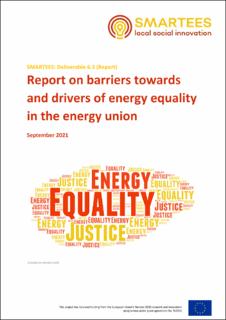| dc.description.abstract | D6.3, “Report on barriers towards and drivers of energy equality in the energy union”, is part of WP6, concerning “Equality and the Energy Union: Data and knowledge analysis” and is based on desk research, as well as qualitative and quantitative data collected at several stages during the whole project. Following the overarching objective of WP6, the data is synthesised, structured, harmonised, and analysed with a particular focus on energy equality to deliver policy recommendations relevant for fostering just social innovations.
In order to fulfil this aim, a literature review was undertaken on the issues of energy equality and energy justice in Europe and based on this review, a template for data analysis was created, considering the possible effects of actions taken in energy social innovations (i.e., the social innovation influencing equality through direct or embodied energy consumption interventions) on energy equality through the satisfaction of three categories of needs (i.e., existence/sustenance, social and value-based needs).
Based on the analysis performed at each SMARTEES case and case cluster level, it appears that most of the interventions had a positive influence on energy equality, at least within the affected area covered by the SI (e.g., most SMARTEES cases are related to just one or only a few issues), by facilitating the satisfaction of citizens’ needs. The satisfaction of physiological and safety needs (existence/sustenance) was facilitated through investments for improving sustainable mobility opportunities, investments for reducing energy consumption in buildings and their associated costs, and/or finally, financial aids. At the same time, the satisfaction of citizens' needs to belong and relate with one another was facilitated through actions favouring family and social relations by encouraging the use of public spaces, encouraging the use of public transports and cycling, and participatory processes of citizens’ engagement. Moreover, the SMARTEES cases showed that several interventions seemed to facilitate the satisfaction of value-based needs through interventions that allowed citizens to pursue actions coherent with their environmental aspirations, attachment to their local area, or ambition to better their condition.
We conclude with a discussion and recommendations that could support social innovations and energy equality policies by adopting distributional, procedural, and recognition justice principles. Specifically, the importance of adequate public funding to support and maintain actions favouring low-income households and the general population is discussed concerning distributional justice outcomes in social innovations. About procedural justice, the importance of participatory and co-design methods is highlighted concerning benefits such as social engagement, an increase of social acceptability and increased social capital in neighbourhoods. Citizens’ organizations are also regarded as essential for social innovations and procedural justice. Thus, recognizing these organizations by the municipalities and engaging them early on could greatly promote social innovations. Finally, because it is hard to reach vulnerable groups, we also stress the importance of targeted approaches, with specific activities and trained or skilled individuals to engage these groups actively. | en_US |
